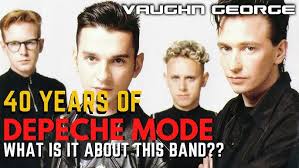
Depeche Mode, one of the most influential and enduring bands of the past four decades, has carved a unique path through the landscape of music. As we reflect on their remarkable 40-year journey, it’s evident that their sound, style, and cultural impact are unparalleled. From their humble beginnings in Basildon, England, to becoming pioneers of electronic music, Depeche Mode’s story is one of innovation, resilience, and artistic evolution.
In 1980, Depeche Mode was formed by Vince Clarke, Martin Gore, Andy Fletcher, and Dave Gahan. The band’s early sound was deeply rooted in the post-punk and new wave movements, with synthesizers at the forefront of their music. Vince Clarke, a talented electronic musician, was instrumental in crafting the band’s early hit singles like “Just Can’t Get Enough.” His departure in 1981, shortly after the release of their debut album Speak & Spell, set the stage for Depeche Mode’s next evolution. Martin Gore, who had initially been the band’s backing vocalist, soon took over as the primary songwriter and lead guitarist.
This transition marked a pivotal shift in the band’s sound, giving way to the darker, more experimental tones that would define their later work. Their second album, A Broken Frame (1982), set the tone for their rise, featuring songs like “Leave in Silence” and “My Secret Garden,” which established Depeche Mode as a unique force in the emerging electronic music scene.
As the ’80s progressed, Depeche Mode’s music became more complex and sophisticated. Albums such as Some Great Reward (1984), Black Celebration (1986), and Music for the Masses (1987) marked their artistic maturity. These records revealed a darker side to the band’s sound, with Martin Gore’s lyrical exploration of love, faith, pain, and human frailty resonating deeply with fans.
The 1984 single “People Are People” was a breakthrough hit, taking Depeche Mode into the American market, where they began to build a loyal fanbase. The band’s exploration of complex emotions and societal themes set them apart from their contemporaries and made them the voice of a generation that was navigating its own struggles and uncertainties.
Their 1987 album, Music for the Masses, marked their first major commercial success in the U.S. The album included hits like “Strangelove” and “Never Let Me Down Again,” cementing Depeche Mode’s place in the global music scene. The accompanying world tour proved to be a critical turning point, with Depeche Mode playing arenas to enthusiastic crowds, further propelling their influence.
The 1990s saw Depeche Mode enter their most experimental phase. Their 1990 album, Violator, remains one of the band’s most iconic works. With tracks like “Enjoy the Silence,” “Personal Jesus,” and “Policy of Truth,” Depeche Mode reached their commercial and artistic zenith. Violator was a perfect synthesis of their evolving electronic sound and introspective, often haunting lyrics. The album’s success catapulted them into superstardom, and its tracks became anthems of the 1990s.
During this time, however, Depeche Mode was not without its struggles. The band’s personal demons began to surface, most notably with Dave Gahan’s battle with addiction. Despite these challenges, the band’s resilience and ability to evolve shone through. Their 1993 album Songs of Faith and Devotion was a reflection of both personal turmoil and artistic growth. The album incorporated elements of rock and gospel, creating a unique blend of electronic and organic sounds. The singles “I Feel You” and “Walking in My Shoes” are quintessential Depeche Mode, offering a mix of sensuality and somber introspection.
Entering the 2000s, Depeche Mode continued to push boundaries while navigating the challenges of an ever-changing music industry. Their 2001 album Exciter brought a more subdued, introspective tone, while Playing the Angel (2005) and Sounds of the Universe (2009) explored new territory in electronic music. Despite occasional shifts in style, the band never lost their unique essence, blending electronic and rock elements with emotive lyrics.
The 2000s also saw the band celebrating their legacy through massive world tours. Even as they dealt with internal struggles and the pressures of fame, the connection between Depeche Mode and their fans remained unshakable. The band continued to sell out arenas worldwide, proving that their influence remained as strong as ever.
The 2010s and Beyond: A Band That Refuses to Fade Away
As they entered their fourth decade, Depeche Mode faced a music industry that had dramatically changed from the one they had known in the 1980s and 1990s. Digital streaming, the decline of physical albums, and the shift toward a more indie-driven scene posed new challenges. Yet, Depeche Mode found ways to stay relevant. Their 2013 album Delta Machine explored the darker, more industrial side of their music, while Spirit (2017) touched on political themes and the band’s disillusionment with the state of the world.
The 2017 “Global Spirit Tour” was one of their most successful tours to date, proving that Depeche Mode had maintained a dedicated and passionate fan base. Tragically, in 2022, the world lost Andy Fletcher, one of the founding members of the band. Fletcher’s death was a poignant moment in the band’s history, but it also underscored the incredible journey Depeche Mode had embarked on.
A Lasting Legacy
Depeche Mode’s 40-year journey is a testament to their evolution as artists and their lasting impact on music, culture, and society. From their early days as a synth-pop band to becoming pioneers of electronic and alternative music, Depeche Mode has influenced countless artists across genres.
Their ability to blend electronic sound with emotive, poignant lyrics has made them a cultural touchstone. Their music speaks to universal themes of love, loss, rebellion, and introspection, resonating deeply with fans across generations. Whether it’s the eerie, hypnotic beats of their early work or the emotional intensity of their later albums, Depeche Mode has never been afraid to evolve, push boundaries, and experiment.
As they celebrate four decades of groundbreaking music, Depeche Mode’s legacy is clear: they are not just a band, but a cultural phenomenon that has shaped the soundtrack of many lives. Their influence continues to reverberate, ensuring that their legacy will live on for generations to come.



